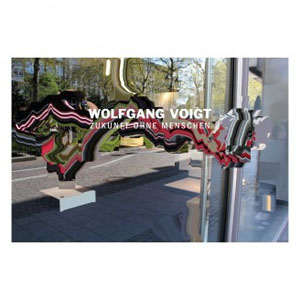Wolfgang Voigt Zukunft Ohne Menschen
Wolfgang Voigt’s career of late has been as quietly baffling as it is low-key and […]

Wolfgang Voigt’s career of late has been as quietly baffling as it is low-key and prolific. Starting around the time of Freiland Klavierwerk, the Kompakt co-founder started to dispense with some fundamental expectations about music being listenable and relatable. Plenty of producers have created machines, literally or figuratively, to create music in their stead, and there can be enjoyment in something that’s purely a product. However, despite its cheery surface, there’s something almost antagonistic in the way Voigt’s latest project, Zukunft Ohne Menschen, rattles off notes with so little regard for their relation to each other or the listener. It’s like a serialist player piano, running through tones breathlessly in a random sequence with defined parameters.
There’s a conceptual hook: Zukunft Ohne Menschen—or “life after people,” a title it shares with a German TV show imagining just that—was created for the entrance to the Art Cologne fair, where Voigt evidently posted up with a manual arpeggiator, guiding this very neutral-sounding music from a god-like remove. The album’s alienation is basically cheerful and benign, true to Voigt’s interest in music—from Wagner to schlager—which is so culturally embedded that it has to be decontextualized before it can actually be heard. Zukunft takes this to a plastic extreme, sounding like the ideal background music for a game of Sim City. Cities rise and fall, unpeopled commuter trains arrive and depart precisely on time, and what emerges is a spectacle of productivity calmly removed from human concerns. In this sense, the album is perfectly successful, even exemplary of the artist’s persistent ideas. But without something more intentional to leverage against, it becomes clear very quickly that listening to it is beside the point—very little can be gleaned from the album that can’t be gleaned from a clip. Initially though, Zukunft isn’t completely ignorable. The album introduces itself with a bit of tension, a couple dollops of sterile 16-bit boogie with glassy arpeggios rising over a dry, pumping beat. However, it quickly settles into circumscribed randomness. Textures, tones, rhythms, and melodies are standardized, and percolate drowsily for the album’s remainder, and the tireless variation is both lulling and irritating.
Although its musical value is negligible by design, there’s more to take away from this album than it might seem. One is the realization that the project Voigt is best known for, GAS, was an anomalous but related expression of the same ideas that drive Zukunft. GAS harnessed ideas of zoom, loop, and alienation to create a sense of all-enveloping presence. The defamiliarization here goes in the opposite direction, an impersonal one where it’s all but impossible to detect the presence of the person responsible. But the album lets us see that it exists on a an impressively broad continuum, a body of work that encompasses the sublime and the ultrabanal. Another side effect is that Zukunft allows the listener to hear the automatism at work in Voigt’s dance productions. There’s always some stiff element nibbling at the coherence of those tracks, too. Zunkuft may be even more sleep-inducing than the average ambient album, but it’s worth admiring for its robust, and not humorless, conceptual solidity. It refuses to break into expression and raises a lot of interesting self-reflexive questions in the process. This kind of technocratic utopia could only exist without people, after all, so it only makes sense that there’s no room for us here.

